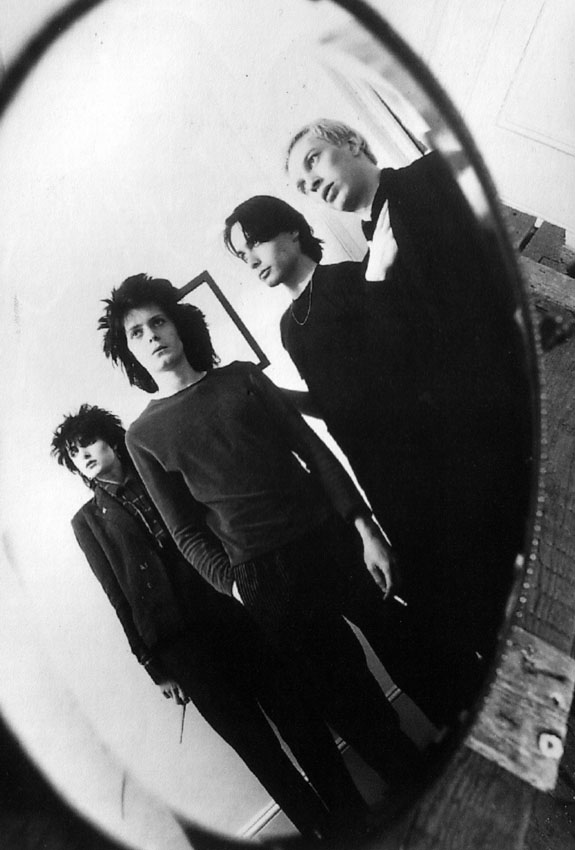 Punk
will forever be associated with the Sex Pistols and their unruly
declamatory that style took no prisoners - least of all TV
interviewers. The roots of punk were ideological, more than
musical. When Punk first reared its head in London in the 1970s,
there was a mood of decline and discontent in the country as a
whole. Unemployment, strikes and wage restraint were the order of
the day, while outbreaks of rioting were common-place. On top of
this, rock groups such as Yes, Led Zeppelin, Pink Floyd and Genesis, with
their grand stage-shows, had become alienated from a new, young generation
that had grown up without the dubious benefit of the 'love-and-peace'
rhetoric of the Woodstock generation. Therefore the best way to
rebel against existing musical attitudes was by doing exactly the
opposite. As rock concerts became ever more expensive, so an
alternative pub circuit emerged; as rock groups became ever more bombastic
and overstated, so groups started knocking out songs of two or three
minutes in duration; and as standards of musicianship increased, so basic
ability - or indeed total inability - to play an instrument was no let or hindrance
to a musical career. History was merely repeating itself:
Elvis Presley had had no formal musical training - he sang what he knew;
and The Beatles flouted conventions by playing Little Richard material,
before penning their own songs. Indeed, in the mid-1960s in the US,
Garage bands such as Mitch Ryder and The Detroit Wheels, The Standells and
? and The Mysterians had briefly made inroads with their brash, pugnacious
celebrations of disenchantment. Towards the end of that decade, both
MC5 and The Stooges would provide a sardonic antidote to the superficial
optimism of the Woodstock generation. As the Woodstock generation
were deflowered, a new wave started to emerge in New York. With
father figures such as David Bowie and Lou Reed of The Velvet Underground,
the clubs CBGB's and Max' Kansas City put on gigs by groups such as
Richard Hell & The Voidoids, The New York Dolls, The Ramones and
Talking Heads. By the mid-70s, the New York New Wave had achieved
its own momentum, as poets such as Patti Smith articulated the mood of
antipathy and disenchantment.
Punk
will forever be associated with the Sex Pistols and their unruly
declamatory that style took no prisoners - least of all TV
interviewers. The roots of punk were ideological, more than
musical. When Punk first reared its head in London in the 1970s,
there was a mood of decline and discontent in the country as a
whole. Unemployment, strikes and wage restraint were the order of
the day, while outbreaks of rioting were common-place. On top of
this, rock groups such as Yes, Led Zeppelin, Pink Floyd and Genesis, with
their grand stage-shows, had become alienated from a new, young generation
that had grown up without the dubious benefit of the 'love-and-peace'
rhetoric of the Woodstock generation. Therefore the best way to
rebel against existing musical attitudes was by doing exactly the
opposite. As rock concerts became ever more expensive, so an
alternative pub circuit emerged; as rock groups became ever more bombastic
and overstated, so groups started knocking out songs of two or three
minutes in duration; and as standards of musicianship increased, so basic
ability - or indeed total inability - to play an instrument was no let or hindrance
to a musical career. History was merely repeating itself:
Elvis Presley had had no formal musical training - he sang what he knew;
and The Beatles flouted conventions by playing Little Richard material,
before penning their own songs. Indeed, in the mid-1960s in the US,
Garage bands such as Mitch Ryder and The Detroit Wheels, The Standells and
? and The Mysterians had briefly made inroads with their brash, pugnacious
celebrations of disenchantment. Towards the end of that decade, both
MC5 and The Stooges would provide a sardonic antidote to the superficial
optimism of the Woodstock generation. As the Woodstock generation
were deflowered, a new wave started to emerge in New York. With
father figures such as David Bowie and Lou Reed of The Velvet Underground,
the clubs CBGB's and Max' Kansas City put on gigs by groups such as
Richard Hell & The Voidoids, The New York Dolls, The Ramones and
Talking Heads. By the mid-70s, the New York New Wave had achieved
its own momentum, as poets such as Patti Smith articulated the mood of
antipathy and disenchantment.
Similarly, in the UK, the pub circuit had created openings for writers such as Graham Parker, Elvis Costello and Nick Lowe and bands like Dr Feelgood. As the number of venues proliferated around the UK, so independent record labels such as Stiff and Chiswick sprung-up. But down in Chelsea, entrepreneur Malcolm McLaren, with fashion designer Vivienne Westwood, gave Punk its focus by creating a visual identity that included straight-leg (not flares) bondage-style trousers. This was, as writer George Melly said, 'Revolt Into Style'. With the image sorted, all McLaren needed was a band. And he found the nucleus of them at his clothes shop, Sex, on the King's Road. Naming them The Sex Pistols, they spawned countless imitators, but more importantly, they fostered a mood of attainability: anything was possible. Other groups such as Siouxsie and The Banshees, The Jam and The Clash were signed up by record labels, causing a feeding frenzy among record company A&R men. While Punk, as a style, remained hot for only a few short years, it caused a change in the mapping of the musical landscape. Once again it seemed that anyone could be in a band with little or no musical knowledge. And anyone could run a record label too. Of late, there has been a sort of revival; forgetting the embarrassing come-back tour of the Sex Pistols, neo-punk bands Green Day and Rancid have both topped the US charts!